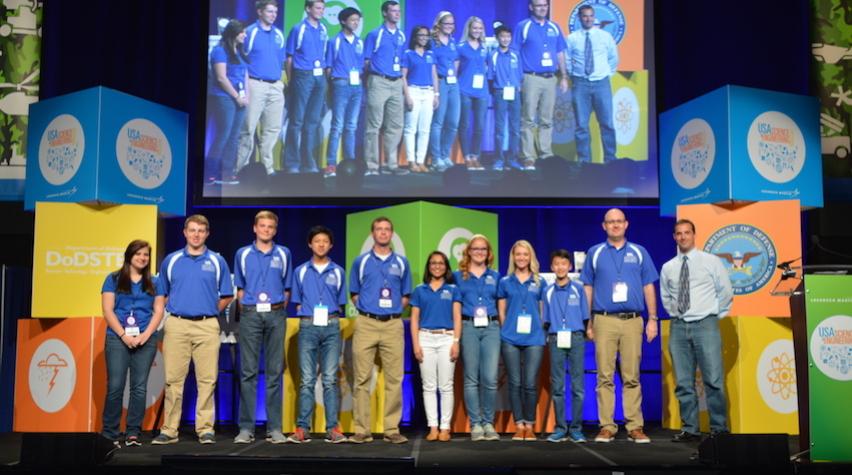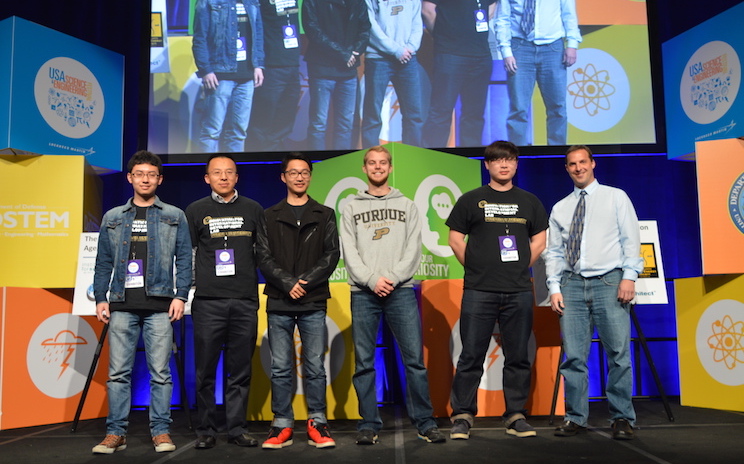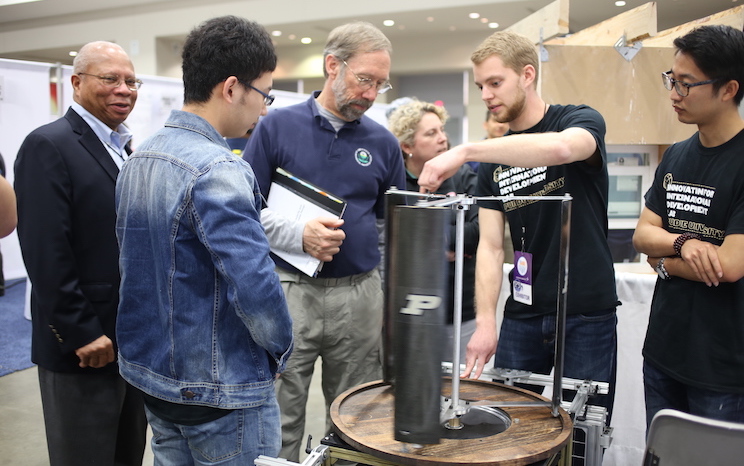
The 2016 YCOSST P3 Award was presented at the 12th Annual EPA P3 National Sustainable Design Expo on 16-17 April in Washington D.C. by judges for the AIChE Youth Council on Sustainable Science and Technology (YCOSST). Student teams displayed their work as they competed for EPA’s P3 “People, Prosperity, and the Planet” award, worth up to $90,000. This year, the 2016 YCOSST P3 Award was split and bestowed upon both Purdue University’s team for ”Development of Distributed Off-grid Wind Energy System for Rural African Communities” and University of Kentucky’s team for ”A Green Chemistry Approach for Producing Non-Synthetic Pesticide in Under-Developed Regions”. The Expo was held at the Walter E. Washington Convention Center, collocated with the USA Science and Engineering Festival (USASEF).
YCOSST P3 Award
The AIChE Institute for Sustainability (IfS) presents an annual award of $1,000 to the competing P3 teams(s) whose project best employs sustainable practices, interdisciplinary collaborations, engineering principles, and youth involvement, and whose design is simple enough to have a sustainable impact without requiring significant technical expertise of its users. This year’s judges were Lyn Beary, NIST (retired); Jeffrey Seay, University of Kentucky; and Lucy Alexander, AIChE IfS. The 2016 award was split between Purdue University and University of Kentucky at the awards ceremony on 16 April 2016. The winners are invited to present their work at the 2016 AIChE Annual Meeting and create a webinar to be disseminated on AIChE’s website.

Preparing for the event, YCOSST judge Lyn Beary was moved by the extent to which sustainability and P3 values were integrated programmatically in the universities and colleges whose projects she reviewed. “It did my heart good,” she reflects, “to see all the great work being done. The next generation of scientists is thoughtful, tuned in, and brings the interesting perspective of youth.” Along with YCOSST judge Jeff Seay, Beary admired the valuable network created among the P3 participating schools.
Purdue University
Development of Distributed Off-grid Wind Energy System for Rural African Communities
Purdue University’s team focused on the technical aspect of bringing wind energy to communities in Africa during the annual dry season. Their Wind Energy System concept design was constructed with a variable pitch mechanism optimized to meet local wind characteristics. The system has been tested in an off-grid area in Africa, and has a portable design that can be easily used on the surface of water, as opposed to anchoring a system on the sea/ocean floor. The current technology has to be mounted high causing issues with birds, considerable land use, and the turbines are less efficient, since they are not able to deal well with wind shifts.

Beary states of the winners’ project that “you could easily see how the technology has the potential to revolutionize the wind energy industry globally” and admits that she would use this product should a commercial home product become available. She goes on to reason that the project has the potential to have a tremendous impact in the wind energy arena. The design allows for the vertically mounted blades on a versatile base to change direction easily with wind influence. The devices are roof-mounted and the portable design is perfect for rural African communities. The winners are indeed a true inspiration for future scientists in providing energy to regions with limited resources.
University of Kentucky
A Green Chemistry Approach for Producing Non-Synthetic Pesticide in Under-Developed Regions
The second winning team, from University of Kentucky, designed a method of pesticide development that is economically sustainable as well as non-synthetic and environmentally friendly. Their non-synthetic pesticide product reduces the release of volatile chemicals and tars into the atmosphere by condensing such chemicals into a non-synthetic pesticide, herbicide, and fungicide known as wood vinegar. The team thus focused on minimized atmospheric pollution by pyrolysis of local biomass. The project is designed to extract wood vinegar from bio char to serve as a natural and benign insect repellant for crops. When Beary spoke with the students, the team brought up the possible use of wood vinegar as a mosquito pesticide as a measure of preventing the spread of the Zika virus. The team had already spoken with student counterparts in Uganda on this issue. Their goal is for the product to cost less than 100 USD and be made from only locally sourced materials that exist in the rural regions where the repellant is used. The University of Kentucky team also brought middle school students to the Science and Engineering Expo, who had been working with and learning from the college students. Clearly, this team is building a next generation of sustainability scientists. Great work!
YCOSST
The Youth Council on Sustainable Science and Technology (YCOSST) was formed by the partnership between the American Institute of Chemical Engineers’ Institute for Sustainability (AIChE-IfS) and SustainUS. YCOSST's mission is to build understanding of sustainability issues and principles, raise awareness of the science and technology behind sustainable choices, and develop grass roots campus efforts. You can learn about, and join, YCOSST here.
This post was co-written by IfS Engineering Specialist Lucy Alexander and IfS intern Marianne Tymocz.

